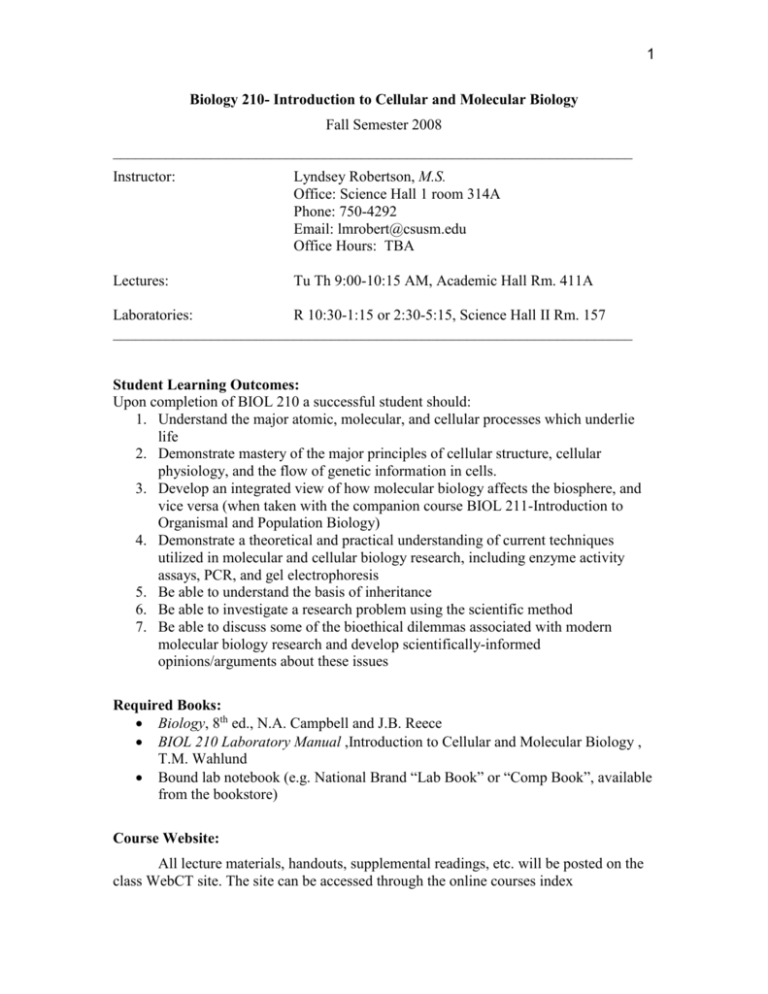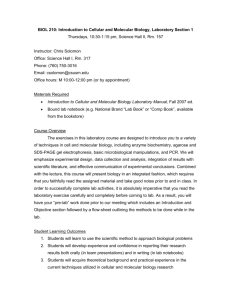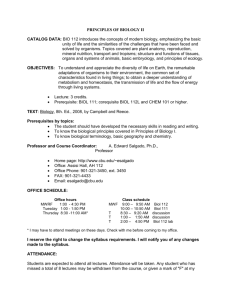Plant Biology 160- Principles of Plant Biotechnology
advertisement

1 Biology 210- Introduction to Cellular and Molecular Biology Fall Semester 2008 _____________________________________________________________________ Instructor: Lyndsey Robertson, M.S. Office: Science Hall 1 room 314A Phone: 750-4292 Email: lmrobert@csusm.edu Office Hours: TBA Lectures: Tu Th 9:00-10:15 AM, Academic Hall Rm. 411A Laboratories: R 10:30-1:15 or 2:30-5:15, Science Hall II Rm. 157 _____________________________________________________________________ Student Learning Outcomes: Upon completion of BIOL 210 a successful student should: 1. Understand the major atomic, molecular, and cellular processes which underlie life 2. Demonstrate mastery of the major principles of cellular structure, cellular physiology, and the flow of genetic information in cells. 3. Develop an integrated view of how molecular biology affects the biosphere, and vice versa (when taken with the companion course BIOL 211-Introduction to Organismal and Population Biology) 4. Demonstrate a theoretical and practical understanding of current techniques utilized in molecular and cellular biology research, including enzyme activity assays, PCR, and gel electrophoresis 5. Be able to understand the basis of inheritance 6. Be able to investigate a research problem using the scientific method 7. Be able to discuss some of the bioethical dilemmas associated with modern molecular biology research and develop scientifically-informed opinions/arguments about these issues Required Books: Biology, 8th ed., N.A. Campbell and J.B. Reece BIOL 210 Laboratory Manual ,Introduction to Cellular and Molecular Biology , T.M. Wahlund Bound lab notebook (e.g. National Brand “Lab Book” or “Comp Book”, available from the bookstore) Course Website: All lecture materials, handouts, supplemental readings, etc. will be posted on the class WebCT site. The site can be accessed through the online courses index 2 (http://lynx.csusm.edu/courses/directory/directory.asp) by selecting BIOL 210 and entering your CSUSM username and password (same as university email). If you are unfamiliar with WebCT, refer to the IITS information page at: http://courses.csusm.edu/resources/webCtBasics.htm Exams and Grading: As an introductory course, BIOL 210 is designed to help you to understand and retain the critical terminology, facts, and concepts of cellular and molecular biology. Just as important, this course will require you to develop and improve your critical thinking and problem solving skills. Both the factual knowledge and the higher order thinking skills which you develop will be essential for success in your upper division coursework and in a career in scientific research, medicine, scientific education, etc. Lecture: Three midterm exams (75 pts. each) will be given during the semester (see lecture schedule), along with a comprehensive final exam (150 pts.). The final can count as much as one-half, or as little as one-quarter of your final lecture exam grade. This is because your score on the final will be divided by two to generate two 75 pt. exam equivalents. Along with the three midterm grades, this will give you a total of five 75 pt. exam equivalents. The top four of these five scores will be summed to yield your total (maximum 300 pts.). Because this effectively allows you to drop one 75 pt. exam, there will be no makeup exams. Please note that material from both lecture and laboratory will be covered on exams and quizzes. In addition to the exams, brief written assignments, designed to reinforce and expand upon concepts discussed during lecture, will form a small component of your lecture grade. Laboratory: Laboratory evaluation will consist of three quizzes (15 pts. each) and two laboratory notebook evaluations (75 pts. each). Late submission of laboratory notebooks will result in the loss of 15 pts. per late day. Laboratory attendance is mandatory and you will not be able to receive credit for a laboratory investigation that you do not attend. Grading Summary: 4 lecture exams: Lecture assignments: 2 laboratory notebook evaluations: 3 laboratory quizzes: 300 pts. 30 pts. 150 pts. 45 pts. Total: 525 pts. Grades will be assigned on a straight percentage: 100-93% = A 92-90% = A89-87% = B+ 86-83% = B 82-80% = B79-77% = C+ 76-73% = C 72-70% = C69-67% = D+ 66-63% = D 62-60% = D< 60% = F 3 Academic Honesty and Integrity: Students are responsible for honest completion and representation of their work. There will be no tolerance for infractions. The instructor reserves the right to discipline any student for academic dishonesty, in accordance with the general rules and regulations of the university. Disciplinary action may include the lowering of grades or the assignment of a failing grade for an exam, assignment, or the class as a whole. Incidents of academic dishonesty will also be reported to the Dean of Students for sanctions at the University level. Disabled Students: Students with disabilities who require reasonable accommodations must be approved for services by providing appropriate and recent documentations to the Office of Disabled Student Services (DSS). This office is located in Craven Hall 5205, and can be contacted by phone at (760) 750-4905, or TTY (760) 750-4909. Students authorized by DSS to receive reasonable accommodations should meet with me during my office hours in order to ensure confidentiality. How to succeed in BIOL 210: 1. Perfect (or near-perfect) attendance 2. Read the assigned material in the textbook before coming to class; the lectures should reinforce your understanding of a topic, not introduce you to it 3. Go to SI review sessions, form study groups, make use of the practice questions. 4. You need to do more than passively comprehend the material. Thoroughly review your notes every week and be sure that you can fully explain the concepts to someone else (e.g. someone in your study group). This will provide you with immediate reinforcement on the week’s material and will make studying for the exams substantially simpler. 5. Come to lab prepared, having thoroughly read the lab manual and completed the prelab prep. Tentative Lecture Schedule Date Topic Readings 8/26 (T) Introductions, course overview Ch. 1 8/28 (R) The chemistry of life: Introduction Ch. 2 9/2 (T) Functional groups 9/4 (R) Carbohydrates + Lipids Ch. 5 9/9 (T) Proteins + Nucleic Acids Ch. 5 9/11 (R) A tour of the cell Ch. 6 Ch. 3-4 re 4 9/16 (T) A tour of the cell Ch. 6 9/18 (R) Review - 9/23 (T) Midterm exam I - 9/25 (R) Membrane structure and function Ch. 7 9/30 (T) Cellular energetics and enzymes Ch. 8 10/2 (R) Cellular Respiration Ch. 9 10/7 (T) Cellular Respiration Ch. 9 10/9 (R) Photosynthesis Ch. 10 10/14 (T) Photosynthesis Ch. 10 10/16 (R) Review - 10/21 (T) Midterm exam II - 10/23 (R) Cell communication Ch. 11 10/28 (T) The life cycle of a cell Ch. 12 10/30(R) Meiosis Ch. 13 11/4(T) Mendel Ch. 14 11/6 (R) Inheritance part I Ch. 15 11/11 (T) Veterans day – No class 11/13 (R) Biotech/Review 11/18 (T) Midterm exam III - 11/20 (R) Inheritance part II Ch. 16 11/25 (T) The flow of genetic information Ch. 17 11/27 (R) Thanksgiving – No class 12/2 (T) TBD 12/4 (R) Final Exam Review - 12/11 (R) Final Exam (7:00-9:00am) - Ch. 20 -







